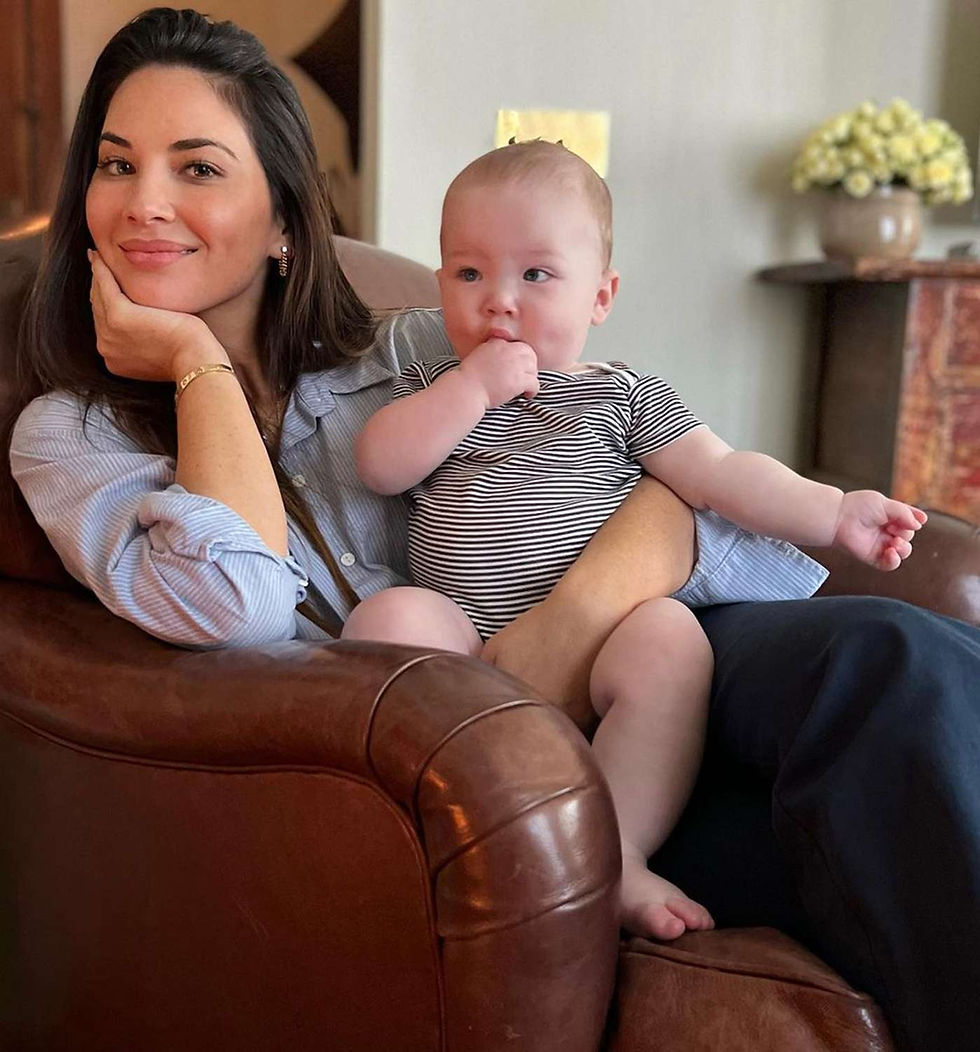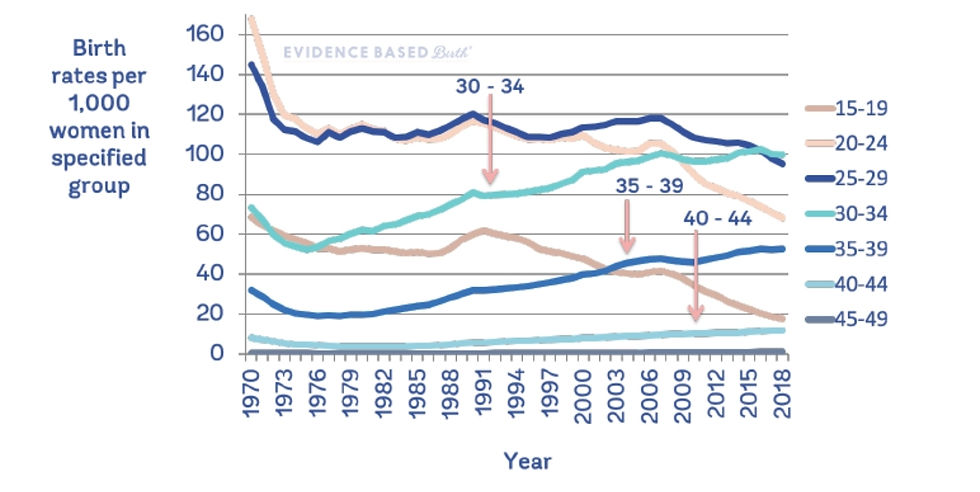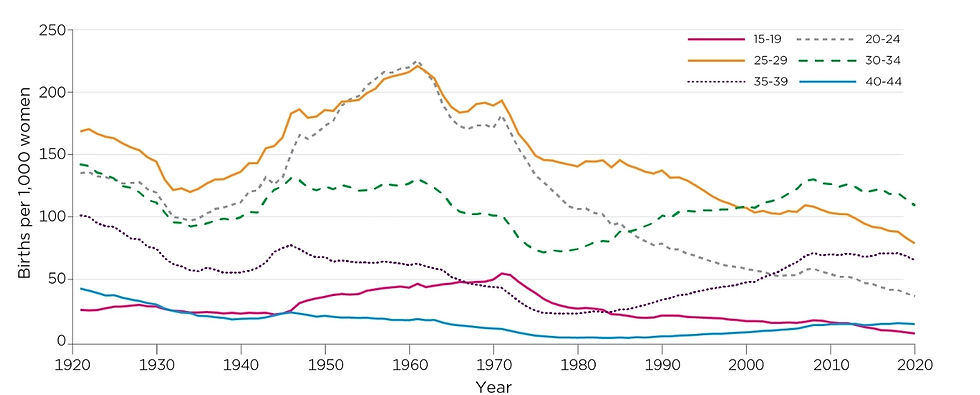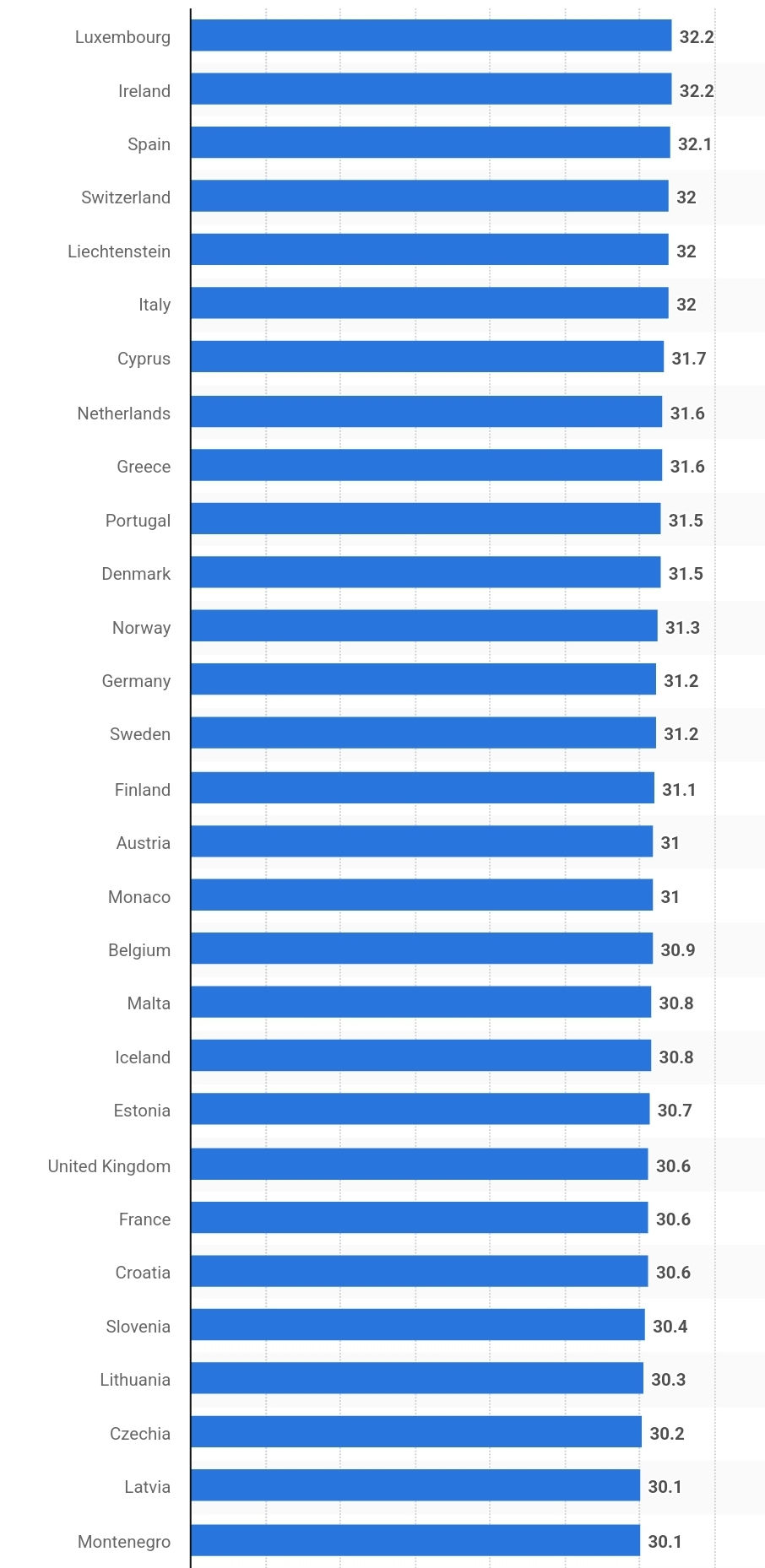40's aint what it used to be for first time Mums.
- Susan Price

- Nov 24, 2022
- 10 min read
Updated: Feb 15, 2023
By Susan Price
Mother first
PHD in Biological science
Obstetrician
Women in Their 40s Having Healthy Babies More Than Ever Before It is a well-known fact that women in their 40s have been having babies for centuries. However, in recent years, more and more women in this age group are having healthy babies. The trend of women having babies later in life is on the rise, and it is a testament to the advances in medical technology and women's health and the fact life expectancy has increased to a point where youth is longer than ever.

Mel 46 with her Husband Brian 47
In the past, women in their 40s were considered to be at a higher risk for complications during pregnancy, such as gestational diabetes, hypertension, and pre-eclampsia. These risks, along with the decreased likelihood of conception, led many women to believe that having a baby in their 40s was not a viable option. However, with advances in medical technology and an increased understanding of women's health, this perception is changing.
One of the main factors contributing to the rise of healthy babies in women in their 40s is the availability of assisted reproductive technologies, such as in vitro fertilization (IVF). IVF has been a game-changer in the world of infertility treatment and has allowed many women to have children when in the past some may have had trouble. The success rates of IVF have increased significantly over the years, and the procedure is now more accessible and affordable than ever before.

Olivia Munn 42 the picture of Youth with baby Malcolm
There has been a noticeable trend of women in their 40s giving birth naturally at higher rates than ever before. This trend can be attributed to several factors, including advancements in medical technology and a greater emphasis on healthy living. However, one of the key factors contributing to this trend is that women are biologically younger and healthier than ever before, recent studies have shown that women in their 40s are not only able to have healthy pregnancies but are also more likely to give birth and get pregnant naturally more than ever before. One of the reasons for this is that women today are biologically younger than women in previous generations. As a result, many women in their 40s are now giving birth to children conceived using their own eggs, which are often healthier and of better quality than those of women in previous generations. Another factor contributing to the trend of natural births among women in their 40s is that they are healthier than ever before. Women today are more aware of the importance of a healthy lifestyle, including regular exercise and a balanced diet. They are also more likely to seek prenatal care and to follow their doctor's advice regarding diet, exercise, and other health-related issues.Additionally, advancements in medical technology have made it easier to detect and treat health conditions that may pose a risk during pregnancy. For example, many women are now screened for gestational diabetes, hypertension, and other conditions during their pregnancy, allowing doctors to address these issues before they become a serious problem. In conclusion, the trend of women in their 40s giving birth naturally at higher rates than ever before is a testament to the progress that has been made in the field of women's health. While there are still risks associated with pregnancy at any age, the increasing number of women in their 40s having natural births is a positive sign for the future of women's health.
Another factor that has contributed to the trend is the increased focus on women's health. With more women becoming aware of the importance of regular check-ups and preventative care, they are taking better care of themselves. This has led to a decrease in the number of women experiencing health problems that could negatively impact their ability to have a healthy pregnancy.
In addition to medical advances and improved health, there are also social and cultural factors that are driving the trend of women having babies later in life. Many women today are choosing to focus on their careers before starting a family. With more women in the workforce and more opportunities for career advancement, it makes sense that many women are choosing to wait until they are in their 40s to start a family.
It is worth noting that while having a baby in your 40s can be a viable option, it is still important to consider the potential risks involved. Women in this age group are still at a higher risk for complications during pregnancy and delivery. However, with proper prenatal care and monitoring, many women in their 40s are able to have healthy and successful pregnancies.
In conclusion, the trend of women in their 40s having healthy babies is a testament to the advances in medical technology and women's health. With the help of assisted reproductive technologies and an increased focus on women's health, more and more women are able to have healthy babies later in life. This trend is a positive sign for women who are choosing to delay starting a family and a testament to the progress that has been made in the field of women's health.
More than 1,000,000 Americans give birth in their 40s each year.
In the Uk The number of women aged 45 and over giving birth is at the highest level since records began 80 years ago, figures show.
The number of live births in this age group rose from 1,619 a decade ago to 2,366 in 2018. In 1938, when records began, there were 2,085 births to women over 45.
Births to women aged 25 and under have steadily decreased since records began. The figures show the average age of mothers and fathers for the 10th successive year, rising to 31.6 and 35.6 years respectively. Which is great when you look at the difference between 20s and 40s biologically being younger than ever before between the two with 45 now being biologically equal to around 26 in 1950. And the fact that 98% of teen pregnancies end up living at or below the poverty line and with 80% raising the child single, no matter what the children with children on tik tok try and make you believe.
US BIRTH RATES PER 1000

Children born to women in their 40s are healthier and smarter than those
Results from an analysis of almost 40,000 children, to be presented at the Fertility Society of Australia’s annual scientific meeting in 2022, showed children of mums in there 40s plus have fewer social and emotional difficulties, fewer injuries and more developed language skills.
The study looked at 1100 children born to younf women aged at least 40 (yes 40s is young), and 38,000 children born to younger women in Britain, at age nine months, three and five years. After accounting for socio-economic factors, the study found that children born to mums over 40 were more likely to be immunised, have fewer accidents and hospital admissions, and score higher on cognitive and academic tests. There was no difference in outcomes whether the child was the first, or subsequent child.
Children born to women in their 40s are healthier and smarter than those born to younger mums, results from an analysis of almost 40,000 kids shows.
Lead researcher Professor Alastair Sutcliffe, from the Institute of Child Health at University College London, said the findings were reassuring for the “rocketing” rates of women who were delaying childbirth. He said the findings had been backed-up similar subsequent studies in Japan and Canada.
“It is contrary to biology for women over 40 to become pregnant,” Prof Sutcliffe said.
“But is they do give birth, their children clearly do better.
“We can speculate in part that the better outcomes are due to older mothers having better life experiences for parenting while 40s also being a'lot younger than previous generations.”
While egg rate does decline as you get older we have to account for the fake no women is the same biological age while one women in her 40s may have more eggs than a women in there 20s due to us humans not ageing at the same rate as our peers even though we get told through plenty of misinformed people think we do.
AUSTRALIAN BIRTH RATES PER 1000

Australians also have the 3rd highest life expectancy in the world at 86 which seems to be a
factor in all of the countries with higher life expectancy. Australia is also a place they look at 60 ls being middle aged.
As much as TikTok and other social media platforms have been utilized by wannabe child influencers to gain likes by showcasing that they had children as children themselves, this is one of the most abhorrent things on the internet right now. People must understand that while it may seem like a lot, it is actually a very small percentage of the population. Young adults who have children at a more recommended age are mature enough to understand that using their children for clout is not beneficial for them when they reach school age. It is estimated that only .001% of parents put their children on social media due to privacy reasons. Therefore, before one assumes that kids having kids is the norm, it is important to recognize that this is not the case. The average age for first time mothers continues to increase as youth become adults for longer and more women choose to travel, go to college, get an education, and experience life's joys before settling down. With the difference in physical looks between 20s and 40s becoming smaller all the time, and life expectancy 30 years more than when being in your 20s was normal to have children, women are realising that settling down in your 30s gives you the best opportunity to still be extremely young, at your physical peak and have the experience of travelling the world and maybe meeting the love of your life outside the small bubble you grew up in. Which is probably one of the biggest reasons of divorce. It is also been proven that women are ready for children well before Men mentally and men will go along with being ready because they don't want to lose there love ones.
One of the biggest cons of having a child too young is the impact it can have on a person's education and career prospects. Raising a child requires a great deal of time and energy, and for those who have not yet completed their education or established a stable career, it can be difficult to balance the demands of parenting with these other important pursuits. This can limit a person's options and opportunities later in life.
Another potential drawback of having a child too young is the impact it can have on a person's social life and personal relationships. Being a parent often means sacrificing time and energy that could be spent on hobbies, friendships, This can be especially difficult for young parents who may still be figuring out who they are and what they want out of life while there friends are still at a age where they want to party, travel and be young and free.
In addition to these challenges, there are also financial considerations to keep in mind. Raising a child is very expensive, and for those who are not yet established in their careers, it can be difficult to make ends meet. This can lead to financial stress and strain, which can in turn affect a person's mental and emotional well-being.
Finally, having a child too young can also have negative impacts on the child itself. Young parents may not have the life experience, emotional maturity, or financial stability needed to provide the best possible care for their child. This can lead to a range of challenges for the child, including developmental delays, behavioral problems, and emotional difficulties which have all been studied emencally.
Dr. David Sinclair, a renowned biologist and anti-aging researcher, led a team that demonstrated that women who have children before fully developing may experience a 30% faster biological aging process, compared to women who wait until their late 20s or beyond when they are fully developed. While it may not affect your looks straight away it can later and biologically it will age you quicker to soem degree.
While social media may present a certain image of teenage motherhood, it's important to acknowledge the potential long-term financial difficulties that can arise from having a child at a young age. Statistics show that over 90% of teen mothers or young parents will live at or below the poverty line for a significant period of time, which can have a ripple effect on their educational opportunities, quality of life, and even life expectancy. It's essential to look beyond the filtered and curated images on social media and consider the real challenges and consequences of becoming a parent as a teenager.
However, mothers who give birth under the age of 23 are also a vulnerable population group, who may experience lower education and reduced employment. This may increase the risk of socioeconomic disadvantage for both child and mother. Children of vulnerable young parents are also at risk of becoming teenage parents themselves a domino effect of something that is very rare.
Teenage motherhood is associated with a number of poorer health and wellbeing outcomes for both mother and baby. In the short-term, babies born to teenage mothers are at greater risk of being born pre-term, with a low birthweight, stillbirth and neonatal death. Children of teenage mothers may go on to have behavioural, emotional and cognitive disadvantages Depression is more prevalent among pregnant teenagers than adult pregnant women or teenagers in general, and teenage motherhood can have a long-lasting effect on mental health.
Teen Pregnancy per 1000 pregnancies per country








Countries with the highest life expectancy seem to have the lowest teen pregnancy rate with Korea at just .5 per 1000 people. ( America's life expectancy is ranked at 69)

Now while this tik tok trend may slightly increase kids in America to have slightly more kids a kids themselves which will increase the poverty rate there and less Women may go to college and form careers for a short period of time. Scientist believe it will only happen for a short time before better prevention education comes in and kids born in the 2000s will realise that the best thing to do is be fully devloped, have a career, life experience and financial stability before settling down. With this the kids that do don't realise that children cost a minimum of $310,605 until they are 18 and $500,000 if they go to college with the percentage of children who go to college from parents who had them as teens at 1.3% because peak earning rates in a good career don't come into until 47 onwards. Which makes sense considering with life expectancy going up, retirement age will also go up to mid 70s. It is very unrealistic that a teenager or super young parents could afford the Minimum which puts them at a disadvantage. With the avg American wage out of college being only $55,260 while only $27,987 for those who don't go to college in there younger years. A college graduate will on average earn well over a million dollars more in a lifetime than someone who does nor go to college. And while those who don't go to college shouldn't have children, they should but they should use there 20s to build a career and be able to save so they can give there children all that they can while they can have a disposable income themselves and that is well after your high school years.
In Higher socio economic countires like Singapore, Australia, Switzerland, New Zealand and Korea the tik tok trend won't effect those countires due to education on the prevention of teen pregnancy being much higher and the popularity of travel and building careers before settling down. These countires have a much different perception on age with 60s being called middle age between the population and anything before youth.
Avg age of first time Mum's per country 2023

.png)






